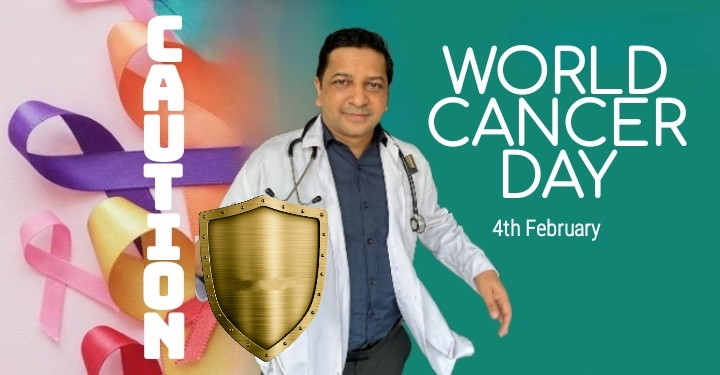AS the world observes Cancer Day on February 4, DR AMIT DIAS explains why cancer is a word – and not a sentence! Early diagnosis and effective treatment are essential to closing the gaps in cancer care. Here’s an informative to understand what cancer is all about and why cancer patients need not be so frightened and intimidated by the Big C…for this battle can be won given the right inputs. Cancer is all about being aware – and cancer cautious!
QUESTION: Everyone is paranoid about the Big C, can you throw more light on cancer?
DR AMIT DIAS: Cancer refers to a group of diseases where cells grow uncontrollably and go beyond their boundaries and invade other organs — we refer to this as metastasis. It arises from the transformation of normal cells into tumor cells that progress from a precancerous lesion to a malignant tumor. It can affect several organs or tissue in the body.
Q: How big is the problem?
A: According to figures provided by Health Minister Mansukh Mandaviya (government of India) the annual cancer incidence in India increased from 14,26,447 in 2021 to 14,61,427 in 2022. The estimated mortality due to cancer has also increased from 7,89,202 in 2021 to 8,08,558 in 2022. The number of actual cases may be much more. Cancer caused 10 million deaths worldwide in the year 2020 alone….and the other big “C” — COVID-19, only made matters worse concerning cancer care. I recollect how it was a nightmare for some of our patients who had cancer and were on chemotherapy during the raging pandemic.
Q: Is there some hope, or is the diagnosis the end of the road?
A: Yes, one should not be paranoid about the word – cancer is not a death sentence. Around 30-50% of cancers can be prevented by avoiding the risk factors and implementing the current evidence-based strategies for prevention. Avoid tobacco –both smoking and smokeless tobacco. Reduce weight, take the recommended vaccines, eat right, stay healthy and be alert with regard to the danger signs of cancer.
All of us know someone who is currently fighting cancer or has survived or died of cancer. Cancer patients and their families need support. I remember the days when my mother was battling cancer and her battle was OUR battle…. and we pulled through it together. On World Cancer day I salute all the cancer warriors in the world. I salute the doctors and nurses involved in cancer care.
Q: Which are the most common organs to be affected by cancer?
A: The most common types of cancer are lung, prostate, colorectal, stomach and liver in men and breast, colorectal, lung cervical, and thyroid in women.
Q: What are the benefits of screening?
A: Screening helps in early detection at a precancerous or a lower stage. There are a lot of medical advances in the management of cancer such as chemotherapy, radiotherapy and surgery. Cancer has a high chance of being cured in case it is detected earlier.
Cancer in the initial stages goes undetected. Screening is a method by which we evaluate apparently healthy individuals to detect cancer. Several such tests are available such as a PAP smear for cervical cancer, mammography for breast cancer, PSA for prostate cancer, etc.
However, despite knowing all this people are often hesitant to go for screening for fear of the outcome. Around 50% of breast cancer patients visit their doctor during stage 3 and 15-20% visit at stage 4.
Q: How do we recognize the early signs of cancer?
A: There is a simple way to remember the danger signs of cancer. Think of the word CAUTION. It stands for ….
C—Change in bowl or bladder habits
A—A lesion that does not heal
U—Unusual bleeding or discharge and unexplained weight loss
T—Thickening or lump (breast, testicle, etc)
I—Indigestion or difficulty swallowing
O— Obvious changes in a wart or mole
N—Nagging cough or persistent hoarseness
I would also like to caution that though these signs can alert you of cancer, the presence of these signs does not mean you have cancer. Please visit your doctor and seek appropriate help. Cancer survival does depend on the cancer type and ranges from 98% in testicular cancer to 1% in pancreatic cancer. In the developed countries more people survive cancer than die of cancer.
Q: What is your message on Cancer Day?
A: The disease is ruthless and spares no one. Let us focus on the prevention and early detection of cancer. Let us all be part of the cancer awareness movement and send a clear message of hope that together we are tougher than cancer and close the treatment gap. Many cancers can be cured if detected early and treated effectively — both EARLY and EFFECTIVELY are important.
(Dr Amit Dias is faculty in the Department of Preventive & Social Medicine at the GMC. He was part of the advisory group for the Can Survive Cancer Campaign for Caritas Goa and has also been involved in cancer research.)
